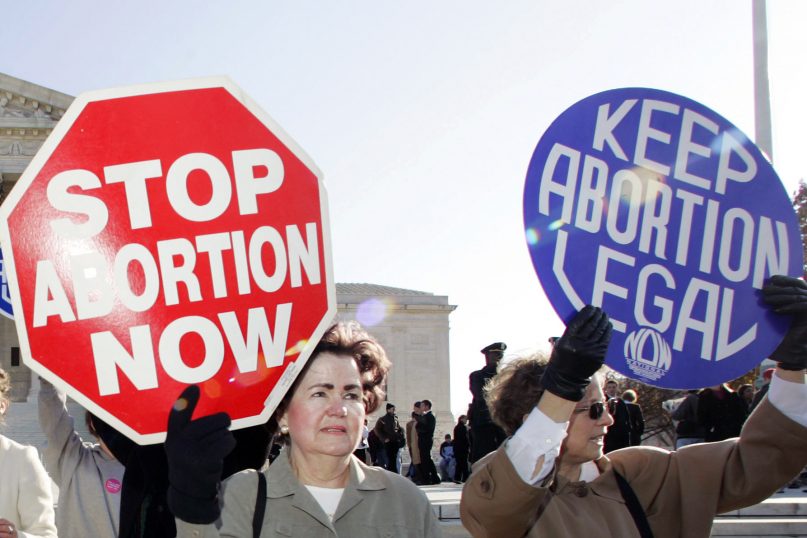(RNS) — For the last half-century, the issue of abortion has distorted our politics and disfigured the process by which we nominate and appoint judges to the Supreme Court. Absolutists on both sides of the issue have treated abortion as a zero-sum game in which either the right of women to have an abortion or the right to life of unborn human beings must triumph. But it isn’t.
If the Supreme Court does overturn Roe v. Wade, the decision that legalized abortion nationally, it will give accommodationists on both sides an opportunity to work toward policies that reflect the long-standing position — however muddled — of the majority of Americans, who are deeply troubled by Roe’s sanctioning of abortion virtually on demand, but who feel that an abortion is in some circumstances morally and medically a woman’s best, and sometimes only, option.
Overturning Roe would shift abortion politics to the individual states, which alone should help defuse the issue as a major factor in presidential elections. Imagine: no more abortion-rights campaign speeches that never mention the fetus or anti-abortion campaign speeches that never acknowledge the emotional turmoil an unwanted pregnancy can create. It will reduce pressure in Washington from pro-choice or anti-abortion lobbyists.
Conversely, imagine the possibility that future Supreme Court nominees will be judged for their suitability and record, rather than by their real or imagined views on a single incendiary issue.
On the state level, abortion would have diminished political consequences. Democrat-controlled states such as New York, California and Illinois have already declared that they will uphold abortion rights regardless of what the Supreme Court does. Twenty-two Republican-controlled state legislatures have passed trigger laws restricting access to abortion if and when Roe is no longer the law of the land.
It seems likely that most — perhaps all — states will permit abortion in the hard cases: rape, incest and immediate physical danger to the health of the mother, which together account for less than 5% of abortions — and for which there is longstanding and overwhelming support from American voters.
In sum, the abortion battlegrounds will shift, but the checkerboard that will emerge will be more reflective of the range of American attitudes toward abortion, which have remained remarkably stable since Roe and almost evenly divided between pro- and anti-abortion rights constituencies.
None of this, however, will substantially reduce the conflict over abortion unless we take one further step to remove abortion itself from the public domain. In a word, Americans must agree to privatize abortion.
By privatizing, I mean a groundswell of private-sector money and effort to resolve the question of abortion beyond the statutory arguments.
If anti-abortion Americans want women faced with unwanted pregnancies to give birth, and if they truly believe that the decision is indeed a matter of human life and death, they should be willing to give of their time and treasure to support those pregnant women with a whole network of social services. Putting their money where their principles are, abortion foes should support pregnant women and new mothers with counseling, nursing, hospitals, post-birth maternal and infant care, including adoption agencies.
Likewise, those Americans who believe that women should be free to abort a pregnancy if they choose to do so should also pony up to match their principles. This means providing transportation and related services to ferry women from states that restrict and ban abortions to states where abortion is legal. This, too, will require time and treasure, including the financial support of abortion clinics.
Only privatization will allow the United States to eliminate taxpayer funding for abortions. In the three years from 2013 to 2015, according to the latest study we have from the Government Accountability Office, taxpayers supplied a total of $1.8 billion to Planned Parenthood and other abortion providers. Much of this money went for services other than abortions, but a separate, highly nuanced 2015 study concluded that public funds, both federal and state, directly and indirectly subsidized at least 24% of all abortions.
Alexis de Tocqueville noted more than 180 years ago this country’s enviable tradition of meeting social needs through the formation of voluntary societies. A great many of those societies were created by religious believers as a practical demonstration of their moral and social convictions.
This proposal stands in that tradition. Privatizing abortion in the manner described will not make the issue disappear. But it will channel the passions that abortion polemics arouse into services to those actually in need. In this way, both sides can help heal a deep wound in the body politic.
(Kenneth L. Woodward was for 38 years Religion Editor of Newsweek and currently is writer-in-residence at the Lumen Christi Institute at the University of Chicago. The views expressed in this commentary do not necessarily reflect those of Religion News Service.)





